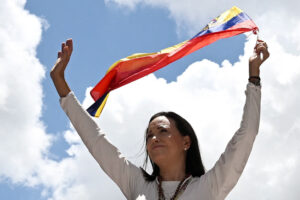
How many comedians does it take to strengthen democracy? The question sounds like the start of a joke. For Amy Becker, it is a serious line of inquiry. Becker, professor of communication and media at Loyola University Maryland and a 2025–26 SNF Agora Visiting Fellow, studies how comedy and satire draw audiences into civic life.
Late-night comedians once shaped political understanding. Programs educated viewers, encouraged accessible forms of participation, and helped people feel capable of navigating civic life. Satirical monologues rivaled traditional news in explaining complex issues such as campaign finance, foreign policy, and climate change. “When you see a political comedy story, when you see them making fun of someone or telling a joke, you need the information to be able to understand the joke. So you seek out additional news information. It’s kind of like this gateway,” Becker says.
“Young people aren’t watching television anymore. They’re looking at videos on TikTok, so political comedians must produce quality material and distill it into 30-second or 1-minute clips that draw people in.” She adds, “People don’t trust the media for information anymore, so these individuals have become what scholars call opinionated journalists. Even though they’re not journalists, they really are giving people information and taking a point of view.”
Becker explores how comedy might encourage dialogue rather than one-sided critique. “Can comedy become more of a site for discussion and encourage the kind of behavior we’d like to see in the public sphere?” she asks. “There’s been this perception for a long time that political comedy makes people cynical. But the research shows it actually makes them feel better about their own ability to understand and participate in politics.”
She points to John Oliver’s approach during the COVID-19 pandemic as an example of how comedy can channel that energy. “What does it mean when you have a comedian telling you where to give money? Instead of a politician or a community leader, it’s John Oliver going on HBO saying this is important and here’s where you should give. And it has an impact.”
Becker also warns that silencing comedians’ voices carries risks. “These guys were the ones holding both the journalists and the politicians accountable, and when we lose that, that’s kind of scary to me.”
These insights shape Becker’s upcoming community workshop at the Stavros Niarchos Foundation (SNF) Agora Institute at Johns Hopkins University: Political Comedy and Entertainment: Saving or Stifling Our Democracy? The event, on Tuesday, November 11, 2025, at 12 p.m., will ask whether political comedy continues to serve as a gateway into democracy or has become one more fractured media niche.
Becker will outline “five things comedy needs to do” to remain relevant. She will also invite participants to reflect on their own experiences with political entertainment: what they watch, how it informs them, and whether they believe comedy can still bring people together.
The workshop reflects SNF Agora’s mission to connect scholarship with practice and to explore, in public conversation, the forces shaping democratic life. “Comedy is more than humor,” Becker says. “It shapes how we understand politics, how we connect with each other, and how we imagine our role in democracy.”
Event Details
Political Comedy and Entertainment: Saving or Stifling Our Democracy?
Tuesday, November 11, 2025 • 12 p.m.

